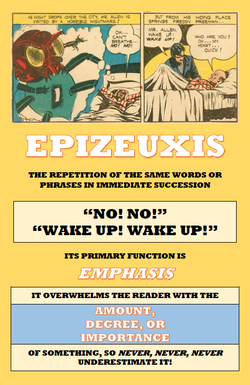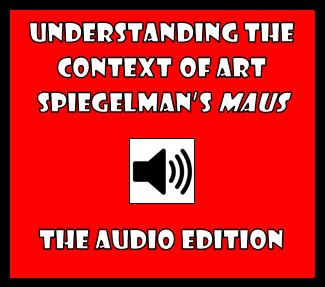|
If I had a dollar for every time I’ve heard someone say that “Comics aren’t real literature,” I’d have enough money to get a photo with my favorite celebrity at a decent-sized comics convention. I figure I’ve heard it said about a hundred times over the course of my career, and that should be plenty for the photo, unless I wanted one with Mark Hamill and James Earl Jones, and hell, who wouldn’t pony up the extra for that? Now I know you’re probably thinking that this is going to be an article in which my Ph.D. in English and I prove how comics really are literature and that people who say otherwise are stupid. I think I’m actually going to do something more useful, which is to show that the entire discussion is stupid. To say that “Comics aren’t real literature” is wrongheaded, but not for the reasons people who object to such statements might expect. It’s for all of the other reasons. For starters, let’s think about what the statement, “Comics aren’t real literature” can actually mean: 1. “Comics are imaginary literature.” I think it’s safe to say that if this is what people mean when they say “Comics aren’t real literature,” they have more problems than you or I can help them with. 2. “Comics merely pretend to be real literature.” Anyone who has ever read a comic should realize that comics aren’t people and can’t pretend to be things. Again, neither you nor I is equipped to deal with such a person. 3. “Comics are mistaken by people for real literature and they’re not.” Go up to a bunch of people reading comics and ask them what they’re reading. Keep track of how many times they turn to you and say, “I’m reading real literature.” I think it’s more likely that 100% of the time they’ll say, “I’m reading a comic book.” Notice, as well, how they’re not fretting about whether what they are reading is “real literature.” 4. “Comics are comics and real literature is real literature.” I absolutely agree that comics are comics. This is true by definition, and I think you’d have to be pretty dim to argue otherwise. I also agree that real literature is real literature whatever “real literature” means. Unfortunately, however, that’s all that the statement manages to prove. 5. “Comics aren’t like plays, novels, or essays. Those things are real literature.” Comics are usually comprised of art, with or without text, arranged in sequence. As such, they are different from plays, novels, or essays. The latter, however, have their own unique characteristics which make them different from one another. Do you know what the above statement doesn’t really prove, though? Whether or not comics themselves are or are not literature. 6. "Comics might technically be “literature,” but they’re not real literature. " You know what…I’m not sure that people who say this actually believe that comics are literature. They use that word “technically” and it leads me to believe they’re being disingenuous. More than that, however, I’m intrigued about the difference between “literature” and “real literature.” I’ll bet you dollars to donuts that they can’t properly articulate the difference between these expressions either. 7. "COMICS ARE SILLY AND REAL LITERATURE IS IMPORTANT!” Of all of these statements, this is the one I most respect. It’s at least the product of a person who knows what he or she means. Ninety nine percent of the time when people say, “Comics aren’t real literature,” this is what they are actually saying. Unfortunately, it’s still stupid and wrongheaded. Consider, for instance, one of the twentieth century’s most important poets of light verse, Ogden Nash, and his most famous poem, “Reflections on Ice-Breaking”: Candy Is Dandy But liquor Is quicker. Now, I love Ogden Nash and I don’t believe he’d mind my thinking that his poem is just a little bit silly despite the fact that it’s occupied the hallowed pages of The Norton Anthology of Poetry. In fact, if you think for a moment about what it’s saying, “silly” is perhaps flattering by today’s standards. On the other hand, when I read Alan Moore and Dave Gibbons’ Watchmen I don’t find it silly, nor would I feel comfortable telling Sarah Leavitt or Alison Bechdel that they were being silly in Tangles or Fun Home for sharing their very personal stories in comic form. I know that The Joker often acts quite silly, but there’s something about him—his consistent lack of motive—that is anything but silly. I don’t often see this quality in other characters, although Shakespeare’s Iago has been offered by some as a point of comparison. I think the point of all of this is that those who say “Comics aren’t real literature” don’t really understand how ridiculous such a statement is. I suppose I don’t mind it as much when people say “Comics are real literature,” although I can’t help but wonder whether they know what they’re talking about either. Comics are a form of artistic expression that (usually) comprises both the textual and the visual, and so focusing only on the former leads to people doing silly things, like overlooking Jillian Tamaki for a Governor General’s Award for the graphic novel, Skim, because she “only” illustrated it. For some, it’s easier, more comfortable even, to deal in absolutes. And, as we all well know, only a Sith does that. That’s right, I’m ending with another Star Wars reference, just because I want this whole silly debate about comics and literature to be over… …or to at least become more interesting.
0 Comments
Your comment will be posted after it is approved.
Leave a Reply. |
Glen DowneyDr. Glen Downey is an award-winning children's author, educator, and academic from Oakville, Ontario. He works as a children's writer for Rubicon Publishing, a reviewer for PW Comics World, an editor for the Sequart Organization, and serves as the Chair of English and Drama at The York School in Toronto. If you've found this site useful and would like to donate to Comics in Education, we'd really appreciate the support!
Archives
February 2019
|



 RSS Feed
RSS Feed
